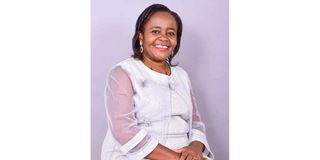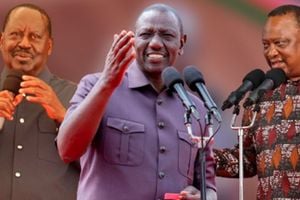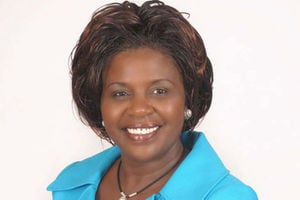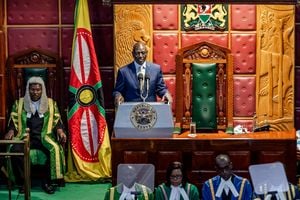Popular singer tunes up bid in Murang’a Senate race

Murang'a senatorial candidate Hellen Kigia.
What you need to know:
- She is running on the Farmers Party with a clarion call to transform how things are done in her county.
- Popularly known as Ngwanirira (I will say it loudly), Kigia says her focus is to address inequalities and she believes the Senate is the best platform to do so.
After enriching and transforming lives through gospel music, Hellen Kigia now wants to do the same through political position that will see her influence public decisions that affect her people.
She is running for the Murang’a senatorial seat on the Farmers Party with a clarion call to transform how things are done in her county. Popularly known as Ngwanirira (I will say it loudly), Kigia says her focus is to address inequalities and she believes the Senate is the best platform to do so.
The Senate, she notes, is where inequalities and inequities can be tackled exhaustively by bringing leaders at the county and national government to account for allocated public resources.
“We are not short of resources in this country. What we need is to close the loopholes that have created an enabling environment for leaders not to perform or deliver to their people as promised in their campaign bids.”
Kigia believes the Senate is better placed in helping address unemployment. “We teach children to be better and to thrive to their fullest potential. But something happens after we have done our work and it is this ‘something’ that we must figure out. The Senate in its oversight role can hold people in public office accountable to ensure every penny counts.”
Education
A teacher with a career spanning over two decades during which she headed schools for 10 years, Kigia speaks highly of education and her lifelong calling to build a formidable human capital that can efficiently and effectively meet the needs of the job market.
“I have taught in the classroom and through music. I now want to influence at the national level, advocating for and lobbying the people of Murang’a. I bring a leadership that is sensitive to the needs of the people, that is attentive and responsive.”
She also brings her managerial skills that include serving as chairperson of the music industry in Murang’a County and vice chairperson of the Ministry of Education’s Central region. In more than two decades, Kigia has taught in Murang’a County in eight different schools, where excellence has been her driving force.
Although it is her first attempt at competitive politics, she is confident that residents will give her chance to lead. “First, I am interested in helping meet the two-third gender rule at the Senate. It is very important that the political space gives us a representation that is gender-balanced. Both women and men are needed in political decision making processes because they play a very complementary role.”
In the absence of a balanced representation, she notes, it is women who are left out and they remain at the periphery of decision-making processes that define the county and country’s direction.
“In the Senate, the few women who are there are able to talk for men, women, youths and children because, more often than not, men are not effective in addressing issues that affect them.”
Campaign hurdles
Kigia believes women’s approach to issues is all-encompassing and does not leave behind people with special needs. But their journey to the decision table to help address some of these issues is not easy. Kigia says women politicians face a lot of challenges. One of these is negative portrayal. They are labelled as “women with lose morals and are accused of relying on and living off men. People also say that if you give women a little power, they become unmanageable and too proud”.
The financial demand of competitive politics is another challenge, which is compounded by the culture of handouts. She is, however, happy that attitudes and perceptions about women leadership is shifting. More people in her community and countrywide are showing receptiveness towards women in the political sphere. They see women are better managers of resources.
“There is significant misuse of resources. Women are transparent, they are legacy driven and highly accountable, and these are the qualities that I intend to bring to the political table. I have been an administrator and my record speaks for itself.
Kigia says when you pull a woman up, everyone goes up, “you will not find a society that is successful where women are excluded from leadership or are pushed to the corners and most invisible parts of the society.”




